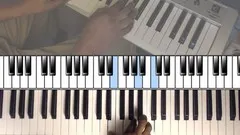
Free Piano Tutorial - Piano Lessons For Absolute Beginners 
This free course provides absolute beginners with the basics of piano playing, including learning notes on the keyboard and music staff, as well as scales and chords. ▼
ADVERTISEMENT
Course Feature
![]() Cost:
Cost:
Free
![]() Provider:
Provider:
Udemy
![]() Certificate:
Certificate:
No Information
![]() Language:
Language:
English
![]() Start Date:
Start Date:
Self Paced
Course Overview
❗The content presented here is sourced directly from Udemy platform. For comprehensive course details, including enrollment information, simply click on the 'Go to class' link on our website.
Updated in [April 29th, 2023]
This course provides an introduction to the piano for absolute beginners. Students will learn how to label a piano keyboard, recognize the notes that correspond to each key, read notes on the treble and bass clefs, and form and perform major scales and chords on the piano. By the end of the course, students will have a basic understanding of the piano and be able to play simple melodies.
[Applications]
The application of this course can be seen in the ability to read and play music on the piano. After completing this course, the student should be able to recognize the notes on the piano keyboard and the music staff, form and perform major scales on the piano, and form and play major and minor chords. Additionally, the student should be able to read notes on the treble and bass clefs. With this knowledge, the student should be able to play a variety of songs on the piano.
[Career Paths]
1. Piano Teacher: Piano teachers provide private and group instruction to students of all ages and skill levels. They help students learn the basics of playing the piano, as well as more advanced techniques. As technology advances, piano teachers are increasingly incorporating digital tools into their lessons, such as online tutorials and virtual instruments.
2. Music Composer: Music composers create original music for a variety of purposes, such as film scores, video game soundtracks, and commercial jingles. They must have a strong understanding of music theory and composition, as well as the ability to play a variety of instruments, including the piano. With the rise of streaming services, music composers are increasingly creating music for digital platforms.
3. Music Producer: Music producers are responsible for overseeing the production of music recordings. They work with artists to create the desired sound and ensure that the recordings meet industry standards. Music producers must have a strong understanding of music theory and production techniques, as well as the ability to play the piano. As technology advances, music producers are increasingly incorporating digital tools into their workflows.
4. Music Therapist: Music therapists use music to help people with physical, emotional, and mental health issues. They must have a strong understanding of music theory and the ability to play the piano. Music therapists use a variety of techniques, such as improvisation, songwriting, and guided listening, to help their clients. As the field of music therapy grows, music therapists are increasingly incorporating digital tools into their practice.
[Education Paths]
1. Bachelor of Music: This degree path is designed for those who want to pursue a career in music performance, composition, or music education. It typically includes courses in music theory, music history, and performance. Additionally, students may take courses in music technology, music business, and music production. This degree path is ideal for those who want to become professional musicians or music teachers.
2. Master of Music: This degree path is designed for those who want to specialize in a particular area of music. It typically includes courses in music theory, music history, and performance. Additionally, students may take courses in music technology, music business, and music production. This degree path is ideal for those who want to become professional musicians or music teachers.
3. Music Technology: This degree path is designed for those who want to specialize in the use of technology in music production and performance. It typically includes courses in music theory, music history, and performance. Additionally, students may take courses in music technology, music business, and music production. This degree path is ideal for those who want to become professional music producers, sound engineers, or music technology professionals.
4. Music Business: This degree path is designed for those who want to specialize in the business side of the music industry. It typically includes courses in music theory, music history, and performance. Additionally, students may take courses in music technology, music business, and music production. This degree path is ideal for those who want to become music industry professionals, such as music executives, music lawyers, or music marketers.
Course Syllabus
Course Introduction
The White Keys, 2 + 3 Black Keys Pattern
Piano Keyboard Layout
Sharps (The Black Keys, Sharps and Flats)
Flats (The Black Keys, Sharps and Flats)
Enharmonic Equivalents
Half Steps (Semitones)
Whole Steps (Tones/Whole Tones)
Piano Keyboard Layouts
Middle C on Piano Keyboard
How to Read Notes: The Staff and Treble Clef
How to Read Notes: The Bass Clef
Ledger Lines (Leger Lines), Middle C and Notes on the Keyboard and Staff
Accidentals (Sharps and Flats) on the Music Staff
Piano Finger Numbers and the C Major Scale
The Major Scale Formula
How to Form and Play the F Major Scale
How to Form and Play the G Major Scale
Major Scales in Every Key
How to Play Major Chords - C, F and G Major
How to Play Minor Chords and Other Major Chords
Major Chords in all Keys
Minor Chords in all Keys
Conclusion and Summary of Beginner's Piano Course
Pros & Cons

Explains concepts well.

Good for beginners.

Easy to understand formulas.

Interesting and step by step teaching.

Identify notes and play melodies, scales, and chords.

Not suitable for experienced learners.

Later chapters are complicated.

Not enough content for advanced learners.
Course Provider

Provider Udemy's Stats at AZClass
Discussion and Reviews
0.0 (Based on 0 reviews)
Explore Similar Online Courses

Growth Insights

A Complete Series on Business Rules in ServiceNow

Python for Informatics: Exploring Information

Social Network Analysis

Introduction to Systematic Review and Meta-Analysis

The Analytics Edge

DCO042 - Python For Informatics

Causal Diagrams: Draw Your Assumptions Before Your Conclusions

Whole genome sequencing of bacterial genomes - tools and applications

Piano Music Theory (Back To Basics) by JFilt

Piano Lessons For Absolute Beginners

Piano Grooves
 Related Categories
Related Categories
Quiz
 Submitted Sucessfully
Submitted Sucessfully
1. What are the two clefs used in piano music?
2. What are the two types of chords that can be formed on the piano?
3. What is the purpose of labelling a piano keyboard?
4. What is the name of the highest note on the piano keyboard?
Correct Answer: C8


Start your review of Free Piano Tutorial - Piano Lessons For Absolute Beginners